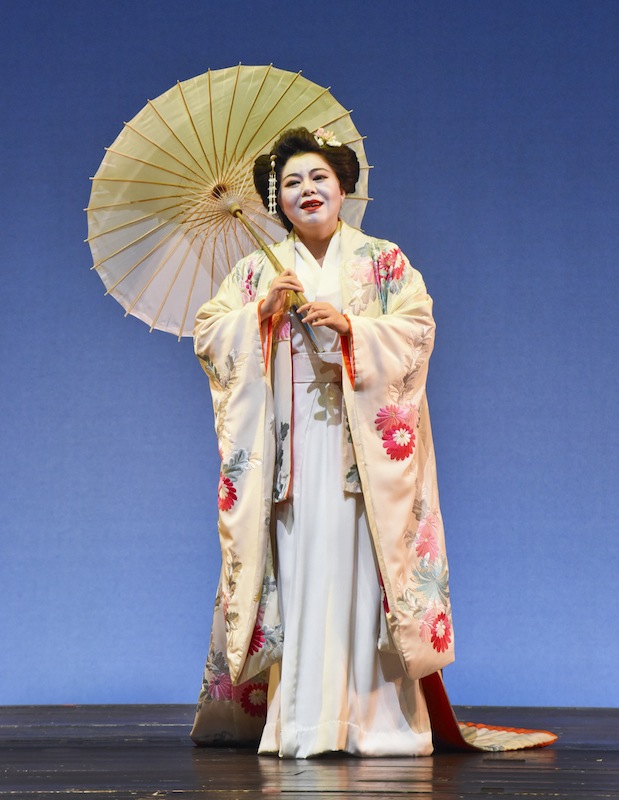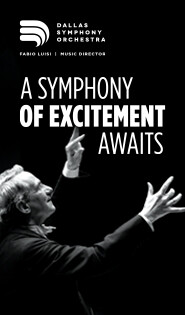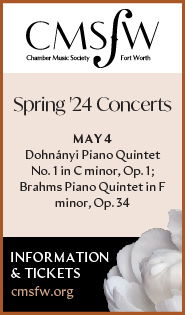With the glorious Hui He, “Butterfly” shines like new at Dallas Opera

Hui He stars in the title role of Puccini’s “Madama Butterfly” at Dallas Opera. Photo: Karen Almond
For many, the thought of yet another production of Giacomo Puccini’s Madame Butterfly inspires more yawns than excitement. It was the fifth most frequently staged opera in the world a couple of years ago.
But don’t let its familiarity dissuade you from attending the Dallas Opera’s current production of Butterfly. With Chinese soprano Hui He in the title role, this glittering Butterfly is a show not to miss.
Hui He gave us a Butterfly for the ages. While the Chinese soprano was not credible as the fifteen-year-old girl that Butterfly is supposed to be, she manages to convey both Butterfly’s childlike innocence and adoration for Pinkerton in the first act and her still-youthful world-weariness in the second.
She accomplishes these feats through her acting, but even more through her glorious, astonishing voice. Bright and pure in the first act, darker and sadder in the second, He’s range and vocal radiance was a wonder. Her “Un bel dì” was chill-inducing, with the soprano capturing both the poignancy and the sweetness of that reality.
Gianluca Terranova made a convincing Benjamin Franklin Pinkerton, the American officer and cad. Terranova’s voice is not particularly powerful one, at least in comparison with Hui He’s, and the orchestra sometimes nearly drowned him out, even in his love duet with Butterfly, “Bimba, Bimba, non piangere.” Still, Terranova manages to get the balance between Pinkerton’s thoughtlessness and his cultural naïveté just right here, with his clear, unaffected tenor paralleling his utter lack of empathy and simultaneous desire for Butterfly.
The Consul, Sharpless, sung by baritone Lucas Meachem, attempts to act as Pinkerton’s moral compass. It is he who expresses distress about Butterfly’s youth, commenting that 15 is “an age for games,” though Pinkerton replies, carelessly, “and for marriage.” Meachem’s voice is steady, lovely, and well-controlled, and through it, he displays both anxiety and compassion for Butterfly. Staging was an issue for Meachem, however. He clearly has an injury to his right leg, so moments in which he repeatedly lowers himself to Butterfly’s floor or kneels beside her to comfort her were painful to watch. Changing this staging in future performances would be a kindness both to Meachem and to the audience.
Mezzo-soprano Manuela Custer’s Suzuki is aptly loving and loyal. Her voice, with its silky richness, portrays her as Butterfly’s only comforter. Bass Reginald Smith, Jr. shone in his brief but pivotal role as Butterfly’s uncle, the Bonze, who boomingly articulates her family’s rejection of her. Goro, the marriage broker, was sung by tenor David Cangelosi, with a suitable opportunistic oiliness.
In a production originally designed for the San Francisco Opera, Michael Yeargan’s sets are spare but effective. In Act I, when Pinkerton is in residence, the rice paper screens remain mostly open, showing his American expansiveness, and Western-style chairs are arranged front and center. In Act II, once Pinkerton has decamped for America, the screens are mostly closed, and the chairs are replaced with a low table and floor pillows. The house, then, becomes more overtly Japanese, with calligraphy panels decorating the screens, and more enclosed, as if to represent Butterfly’s largely self-imposed captivity.
Yeargan also designed the costumes, which are mostly in muted colors—tan suits for the men, kimonos in subdued colors for the Japanese women, a cream-colored dress for Pinkerton’s American bride Kate. The exception is Cio-Cio-San’s wedding outfit—a vividly embroidered kimono that shows her to be a butterfly among moths.
Donato Renzetti is leading the Dallas Opera Orchestra for this production, with generally good results. Ensemble in strings was tight and focused, and solos by concertmaster Ami Campbell and principal flute Helen Blackburn were lyrical wonders. However, Renzetti too often allowed the orchestra to overpower the singers–a seemingly regular problem for this ensemble no matter the conductor.
The Dallas Opera Chorus, prepared by Alexander Rom, was magnificent with a lovely rendering of the “Humming Chorus.”
Madame Butterfly runs through March 26. dallasopera.org



Posted Mar 11, 2017 at 7:33 pm by Mary Williams
Yes, it was a beautiful production very well done.
And it may be a chestnut for opera goers, yet from my conversation and observations, there were many people that this was their first experience with opera, Puccini, and all. Lots of young people in the fifth balcony ! The consul’s difficulty with sitting was interpreted from that distance as staging, as an older man was trying to cope with his age while respecting cultural differences.
However, someone in real pain needs help.